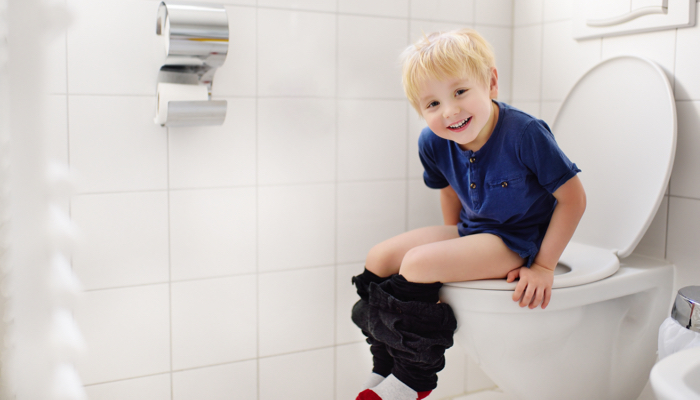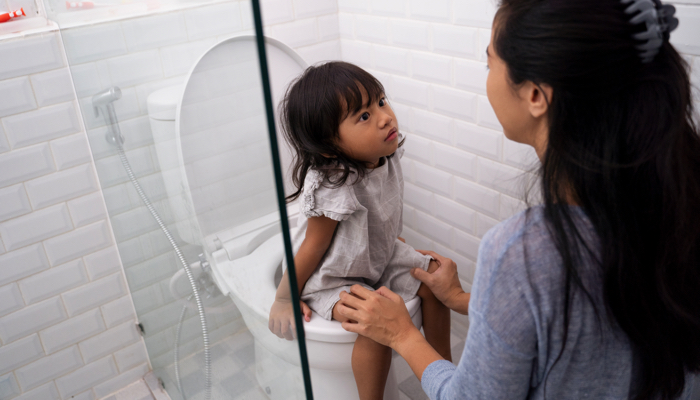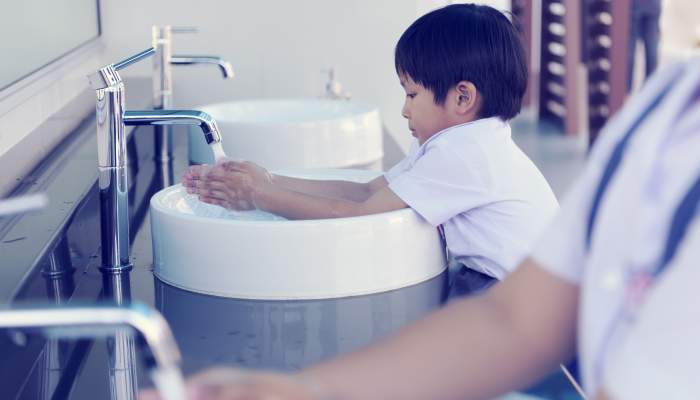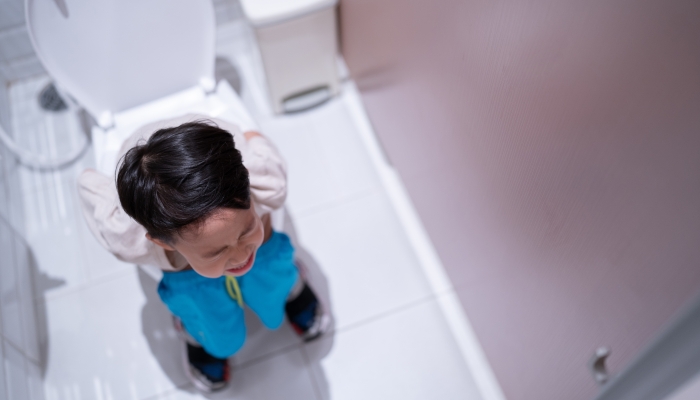Late Potty Training: 9 Tips to Help

- Potty training is considered late if your child is over 3 and has been trying for more than 3 months.
- Potty training is most often delayed by strong-willed refusal, reminder resistance, toilet phobia, or a medical condition.
- It’s never too late to start potty training, and with the right guidance it could be faster than potty training a younger child.
The average age to start potty training has gone from 12 months in 1940 to 3 years today. That’s a difference of 2 years! Toilet training kids in 1940 were just starting to pull up on the couch and those same kids in the 2020s are now scaling the jungle gym. They were barely managing to say “cow” and are now effortlessly negotiating for snacks.
So, it stands to reason that potty training a child over 3 might look a little different to teaching a tiny tot. The classic methods won’t always work, and they aren’t called “threenagers” for nothing. They’re stubborn, know their own minds, and crave control. This can make late toilet training a little tricky. But, with the right potty training tips and strategies, you’ll have it cracked in no time.
What is Late Potty Training?
Late potty training is when a healthy child over age 3 isn’t trained within 3 months of trying. If you haven’t attempted to potty train your 3-year-old due to life getting in the way, they won’t yet count as late. This means you can follow the classic potty training methods and could be ditching diapers soon.
If, however, you’ve been trying for months without success, then you have a late trainer on your hands. But don’t worry—there are some great strategies available to help.
What Causes Late Potty Training?
There are so many reasons your child may be late to be toilet trained. However, the majority of cases can be broken down into three main causes: medical issues, resistance or refusal, and toilet phobia.
Medical Conditions
Sometimes there’s a medical reason your child is struggling to master the potty. If your toddler seems really keen to be potty trained, runs for the toilet, is upset by accidents, and still isn’t succeeding—it could be a sign of an issue.
The most likely problem is a urinary tract infection or constipation. Fortunately, both can be easily solved with a visit to the pediatrician. Certain developmental delays can also slow down your child’s readiness to use the toilet. In this case, ask for support from the medical professional who knows your child best. And be sure to read our advice on potty training a special needs child.
Toilet Training Resistance or Refusal
If your child throws tantrums when you remind them to use the potty, screams on the way to the bathroom, or is having accidents on purpose, you might be dealing with toilet training refusal or resistance. This is common in children who are particularly strong-willed and don’t like being told what to do.
Sometimes this behavior can be triggered by punishments or being held on a potty during the start of toilet training. But, most often it’s just reminder resistance, or becoming fed up with being asked to use the toilet too frequently.
Toilet Phobia
Both medical conditions and negative experiences can lead to toilet phobia in children. If your child has experienced painful pees or poops due to a medical issue, they might become afraid of using the toilet. Some children also become scared to poop on the potty if the toilet flush is loud, the bathroom is scary, or the toilet seat has pinched them.

9 Tips to Help Late Potty Trainers
The great thing about potty training over 3s is that they require so much less physical help from you. They can get to the potty, pull down their pants, and even wipe on their own. Often, the best advice for attempting toilet training late is to create a great potty training environment and then take a step back.
3 Tips for Every Late Potty Trainer
- Ditch the diapers: If your child is over 3, they should be able to crack potty training without pull-ups or diapers. In fact, these are likely to delay success since they’ll absorb the pee and accidents won’t be uncomfortable. Instead, take your child shopping for big kid underwear with their favorite characters on them. They should want to look after their fancy new pants and won’t want to get them dirty.
- Make sure the potty is easy to get to: Keep a potty in each room that your child spends a lot of time in. This could mean having more than one. Sometimes the reason for a toddler resisting toilet training can be as simple as a trip to the bathroom taking too much time away from playing or being afraid to cross the hallway. Fix the issue by keeping a potty close by.
- Use praise and rewards: Make toilet training fun and rewarding with a potty training chart. Let your child earn a sticker for every successful trip to the potty, and choose a reward for filling the chart. The best potty training rewards are things that’ll make your toddler feel special and grown up, rather than candy or toys. Let them choose a movie, a day out or even your outfit (if you’re feeling brave).
3 Tips for Toilet Training Resistance or Refusal
- Put your child in charge: Explain that their body will make pee and poop every day and that it’s their job to get it into the toilet. You know that they’re a big kid now, and they don’t need your help. They’ll feel in control and won’t have anything to fight against anymore.
- Stop reminders: Now that your child is in charge, it’s time to stop reminding them to use the potty. Even when they’re doing the pee-pee dance! Yes, there will be accidents, but when they finally get it right they’ll know they achieved it all by themselves!
- Shift your attention: Toddlers crave attention, and they don’t mind how they get it or whether it’s good or bad. If accidents get them 10 minutes of mom cleaning them up, changing their clothes, and chatting about funny pees and poops, they’ll keep doing it. Instead, treat the accident as if it’s no big deal, and go wild for successful trips to the potty. They’ll soon notice which gets the most attention.
3 Tips For Toilet Phobia
- Use breathing techniques: Pain when using the potty due to medical issues can often be fixed with antibiotics or stool softeners. However, your child may remember it hurting and become afraid even after the condition is fixed.
- �
- Work through this by teaching them some deep breathing techniques. Have them try breathing through their nose, counting to five for each inhale and exhale. This should help them to relax and allow them to go.
- Address any fears: Find out what’s scaring them and fix the problem. Common fears include a noisy toilet flush, falling in, a dark hallway, a spooky bathroom cupboard, or simply the fear of missing out.
- Be sure the potty is comfortable: Unfortunately, not all potties and training seats are created equal. Make sure your child loves their potty and that it feels comfy for them. Perhaps let them choose a potty themselves. They could pick out their own toddler step stool to make those trips to the potty even easier.
Is There Ever a Good Reason to Delay Potty Training?
Sometimes it isn’t the right time to potty train. It’s a big change for every child and should be done when their life feels calm and stable. Some good reasons to delay include;
- Moving to a new home
- A new sibling
- Bereavement
- A medical condition or illness
Is There Such a Thing As Too Late For Potty Training?
If you’ve delayed potty training due to a house move, the arrival of a sibling, or for any number of reasons, you might be wondering if you’re too late. The good news is that the average age to start training is now 3 years, so you’re not the only one. However, there’s evidence of an increased rate of stool withholding and functional constipation in children who are trained after 3.5 years. So, if your little one is over 3, it’s worth starting sooner rather than later.
When Should I Worry About My Child’s Late Potty Training?
If your child reaches 4 years old without being potty trained, they’re likely to start feeling upset or embarrassed by accidents, particularly if they’ve started school. This could affect their confidence and wellbeing. However, they wouldn’t be alone— 2% of children are potty trained after turning 4. Set up an appointment with their pediatrician for support.
The most important thing to remember is that all children develop different skills at different times. So, while your 3 or 4 year old may still be struggling with accidents, they’re likely to be impressing you with their finger painting, funky dancing, or incredible sense of humor. The potty training journey is a messy one, but stay positive and you’ll be saying goodbye to diapers and pull-ups before you know it.

Related Posts

IEPs, Potty Training
7 Sample Toileting IEP Goals
Toileting IEP goals should address the specific needs and abilities of each child. Be flexible and patient as your child works on their toileting skills.

Potty Training
How To Deal With Constipation When Potty Training
Constipation is common amongst children of potty training age. Many children suffer from potty training constipation, but there are things you can do to help.

Potty Training
5 Potty Training Games To Make Potty Training Fun
Learning to use the toilet doesn’t have to feel like hard work. There are lots of potty training games you can play with your toddler to make learning fun.